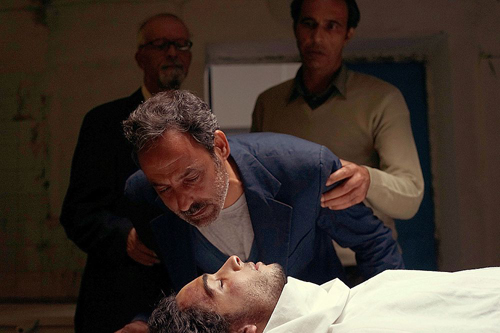TN/BE 2018, R: Mahmoud Ben Mahmoud mit Ghalia Benali, Ahmed Hafiene, Sarra Hannachi, 102 Min, OmU (arab.)
Tunis, 2013. Nachdem sein Sohn Marouane bei einem Motorradunfall ums Leben kam, kehrt der in Frankreich lebende Brahim zum ersten Mal seit Jahren nach Tunesien zurück. Trauer um seinen Sohn mischt sich mit Schrecken angesichts der jüngsten politischen Veränderungen in seinem Heimatland. Zwar konnte die Diktatur von Präsident Zine El Abidine Ben Ali beendet und eine parlamentarische Demokratie eingeführt werden. Aber als Konsequenz der neuen Redefreiheit erheben jetzt auch Salafisten und islamistische Extremisten das Wort. Der liberale Brahim erfährt nicht nur, dass gegen seine Ex-Frau, die Autorin Loubna, aufgrund ihres jüngsten Buchs eine FATWA verhängt wurde, sondern auch, dass sein Sohn in einer radikal-islamistischen Gruppe aktiv war. Brahim versucht herauszufinden, wie es dazu kam. Mahmoud Ben Mahmouds investigatives Drama erhielt 2018 den Hauptpreis der Journées Cinématographique de Carthage in Tunis, dem ältesten Filmfestival Afrikas.
Trailer:
EN:
Brahim Nadhour, a Tunisian living in France, returns to Tunis for his son who died in a motorcycle accident. He discovers that the young Marwan was working in a radical Islamist group. Brahim decides to conduct his investigation to understand the reasons for his radicalization and identifies people who have not been indoctrinated. Best Film and Best Actor for Ahmed Hafiane at The Carthage Film Festival. “The decision to call the film Fatwa, according to Ben Mahmoud, is aimed at showing how words are malleable things that can change meaning and significance over time. ‘I come from an Islamic background,’ he says. ‘My father was an Imam and my uncle was a mufti, a legal scholar that gives out fatwas. Back then – and this is something westerners don’t know – fatwa had a very positive meaning and the goal of a fatwa was to facilitate Muslims when it came to coping with life.’ ‘Then after Khomeini declared a fatwa on Salman Rushdie it changed from something peaceful to something bloody. That’s why I chose this name, because it’s controversial…” (thenational.ae) “Co-produced by the Dardenne brothers and their Les Films du Fleuve outfit, … As with much of the work of the Dardennes, Fatwa uses the determination of a single character to show the problems inherent in society. … Fatwa argues that liberal voices in the Muslim world need to make their voices heard, despite media disinterest, before it’s too late” (cineuropa.org)
